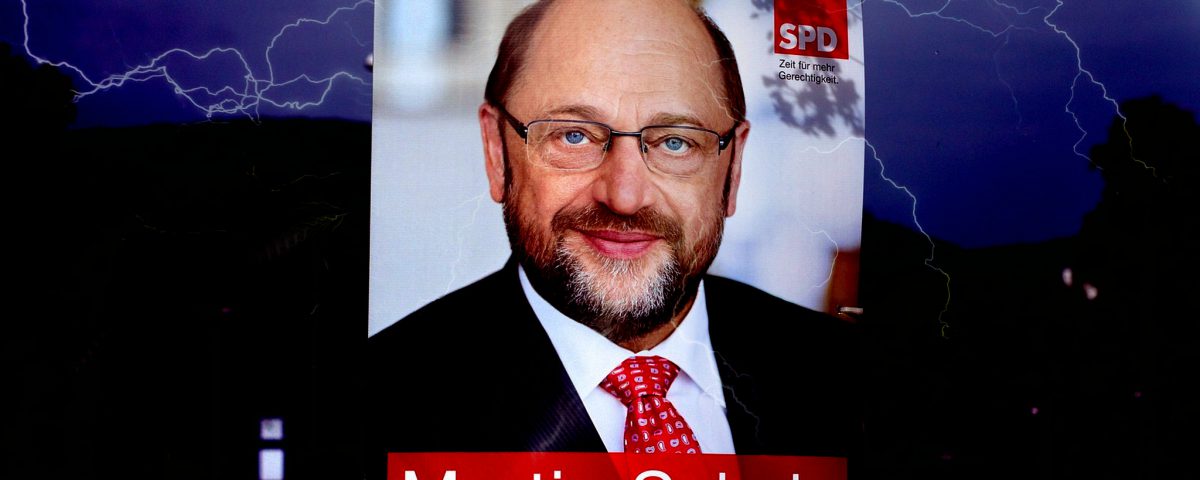On September 24, Germans headed to the polls to elect a new parliament. Despite Angela Merkel’s Christian-Democrat CDU/CSU losing massively in support, she remains in a position of forming a government in the coming months. Her Social-Democrat rival Martin Schulz however lost his shot at the Chancellor’s office and announced on Sunday evening that his party will go into opposition. How is it possible that Merkel, who had to deal with the considerable plunges in public opinion due to the refugee crisis, still sees herself maintained by the electorate? It would need to be said that current polling is not due to Merkel’s overperformance, but rather to her rivals underperformance.
The Social-Democrat SPD, currently in coalition with Angela Merkel’s party, had gotten all excited when Martin Schulz announced his bid for the most powerful position in the country. So excited indeed, that the former chairman of the European Parliament was approved with a Stalinian 100 per cent at the party’s congress in Berlin. For a certain amount of time, Schulz was at an all-time-high in the polls, and 4,000 new members joined the social democrats, only to be disappointed in the end, because what political commentators had described as the “Schulz effect” turned out to be hot air. Although that might be an unfair comparison: at least hot air rises.
No wonder that Schulz was able to enjoy such a record high in the polls: despite announcing him as their candidate, the social democrats did not release a party manifesto until late in the campaign. This is because Schulz’s aggressive pro-EU stance is wildly unpopular. He advocates for more political integration, argues for EU budgets directly financed by the member states, and considers nation states to be of the past, while ironically building a bigger one. In July, Schulz openly backed the idea of Germany contributing more to the European Union, despite it already being one of the countries that spends more in contributions than it takes in.
More repulsive than Schulz’s advocacy for the European Union is attitude towards those who oppose it. He is known for his sneery and patronising attitude towards various countries, as his career picked its way through the Brussels and Strasbourg parliament. He called US President Donald Trump “un-American” and implied that the Irish No-Vote in 2009 “opened the door to fascism”.
He also called Dutch MEP, Daniël van der Stoep, a fascist for asking Mr Barroso, then President of the EU Commission, to publish details of his expenses accounts in 2010. However, outside of a tendency to use profanities in respectable parliament buildings, Schulz has little to offer politically. His years spent in the European Parliament left little mark.
If Brexit taught us one thing, then it’s that the tactic of smearing your political opponent and implying that their solutions will lead into inevitable chaos, have little to no effect on the electorate. And yet, little has it stopped EU-advocates from making this exact point. During a rally in June, Martin Schulz said the following:
“Yes, there is an alternative for everything, including for Europe [meaning: European Union]. But the alternative to the Europe that we have today is, we know that already: it’s the Europe of the last century! That of murder, manslaughter, the fantasy of big and powerful empires, the reigns of autocracy. That is not my Europe, that is not the social democrat Europe.”
One might observe that this must sound oddly familiar to David Cameron, who said before the EU referendum that “Brexit could lead to Europe descending into war”. It seems as if we’ll soon observe Poland declaring war on the UK and the Swedes sending their fleet to fall into Scotland. With Martin Schulz, at least the Nazis will be back. Makes for a more interesting story.
His fellow countrymen are increasingly unimpressed by this rhetoric. According to a recent TNS Infratest Politikforschung poll, 42 per cent of Germans favour a referendum on Germany’s membership in the EU, and 62 per cent agreed with the statement that the union “is not moving in the right direction”.
Even mainstream parties in Germany will consequentially hinder European integration. The German Liberal Democrats oppose Emmanuel Macron’s euro-reforms and the Greens will make security reforms difficult.
Brexit has empowered citizens of all EU countries to question the status quo in Brussels. It turns out that repeatedly implying that eurosceptics are “fascists” only goes so far.
The aggressive pro-EU path of Martin Schulz hurt his credibility and his party, and are very likely give us another four years of Angela Merkel. And that might, considering the alternatives, not even be that bad.
Picture: Creative Commons opposition24.de
This piece solely expresses the opinion of the author and not necessarily the organization as a whole. Students For Liberty is committed to facilitating a broad dialogue for liberty, representing a variety of opinions. If you’re a student interested in presenting your perspective on this blog, click here to submit a guest post!

